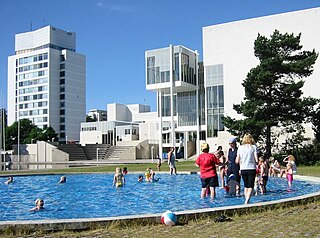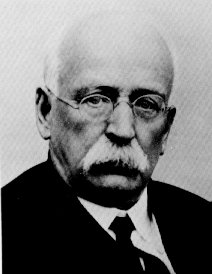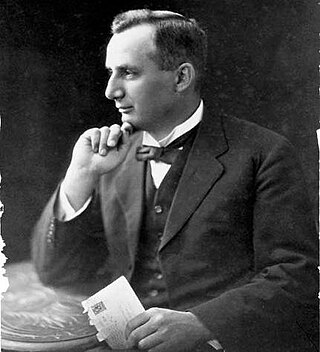
Tapiola is a district of the municipality of Espoo on the south coast of Finland, and is one of the major urban centres of Espoo. It is located in the western part of Helsinki capital region. The name Tapiola is derived from Tapio, who is the forest god of Finnish mythology, especially as expressed in the Kalevala.

Sir Ebenezer Howard was an English urban planner and founder of the garden city movement, known for his publication To-Morrow: A Peaceful Path to Real Reform (1898), the description of a utopian city in which people live harmoniously together with nature. The publication resulted in the founding of the garden city movement, and the building of the first garden city, Letchworth Garden City, commenced in 1903.

Welwyn Garden City is a city in Hertfordshire, England, 20 miles (32 km) north of London. It was the second garden city in England and one of the first new towns. It is unique in being both a garden city and a new town and exemplifies the physical, social and cultural planning ideals of the periods in which it was built.
The Town and Country Planning Association (TCPA) is an independent research and campaigning charity founded and based in the United Kingdom. It works to enable homes, places and communities in which everyone can thrive. Through its research, training, events, publications, and campaigns, it works to challenge, inspire and support people to create healthy, sustainable and resilient places that are fair for everyone. It does so informed by the Garden City Principles.
The Royal Town Planning Institute (RTPI) is the professional body representing planners in the United Kingdom and Ireland. It promotes and develops policy affecting planning and the built environment. Founded in 1914, the institute was granted a royal charter in 1959. In 2018 it reported that it had over 25,000 members.

The garden city movement was a 20th century urban planning movement promoting satellite communities surrounding the central city and separated with greenbelts. These Garden Cities would contain proportionate areas of residences, industry, and agriculture. Ebenezer Howard first posited the idea in 1898 as a way to capture the primary benefits of the countryside and the city while avoiding the disadvantages presented by both. In the early 20th century, Letchworth, Brentham Garden Suburb, and Welwyn Garden City were built in or near London according to Howard's concept and many other garden cities inspired by his model have since been built all over the world.

The Singapore Improvement Trust (SIT) is a former government organisation that was responsible for urban planning and urban renewal in Singapore. Formally established in 1927 under the Singapore Improvement Ordinance, it was modelled after similar organisations in India. The SIT initially carried out back lane improvement schemes and marking out unsanitary buildings for demolition, but began constructing public housing from 1935. After 1945, the SIT initially focused its efforts on the repair of its residential developments. It resumed constructing public housing in 1947 but was unable to keep up with demand. The SIT was also involved in the development of a "Master Plan", which set out Singapore's developmental direction, from 1952 to 1958. In the late 1950s, plans were set out to replace the SIT with two departments—housing and planning—culminating in two bills that were passed in 1959. With the establishment of the successor organisations by the government of Singapore, the Housing and Development Authority and the Planning Authority, in 1960, the SIT was dissolved.

Charles Compton Reade was a town planner who supported the garden city movement of the early twentieth century.
The Eastern Regional Organisation for Planning and Housing (EAROPH) is a non-governmental multi-sectorial organisation encompassing the private, public and academic sectors. The organization was established to foster the exchange of insights and experiences among countries in the EAROPH region, which has been acknowledged as the most dynamic in the world in terms of economic growth, magnitude of urbanization, population size and ethnic diversity. The EAROPH region covers all countries in Asia, Australasia and the Pacific region.

The Housing, Town Planning, etc. Act 1909 was an Act of the Parliament of the United Kingdom which prevented the building of "back-to-back" houses. The act also meant local authorities must introduce systems of town planning and meant homes had to be built to certain legal standards.
While purpose-built towns and cities have many precedents in antiquity - the 195 BC iteration of Chang'an providing a case in point - the New Towns movement refers to an ideologically-driven social campaign. The best-known and possibly most influential of these was a government-driven building and development program which took place in two tranches in the United Kingdom after World War II. Towns were planned and built with two main intentions: to remedy overcrowding and congestion, and to organize scattered ad hoc settlements. An additional purpose was to rehouse people in freshly built, fully planned towns that were completely self-sufficient for the community. Ideological aspects of environmental determinism predominated in this last purpose.

Letchworth Garden City, commonly known as Letchworth, is a town in the North Hertfordshire district of Hertfordshire, England. It is noted for being the first garden city. The population at the time of the 2021 census was 33,990.
The London Society is a British membership organisation established to encourage public interest and participation in urban planning and transport matters in London as well as to study and celebrate the capital's unique history and character. It is among the oldest civic societies in the United Kingdom.

Fæstningens Materialgård is a former military storage facility at 30 Frederiksholms Kanal in Copenhagen, Denmark. Arranged around a central courtyard, the individual buildings have been built to a homogeneous design, all with yellow-washed facades, green doors and gates, white window frames and red tile roofs, but they have in fact been accumulated over an extended period of time, mainly between 1740 and 1925. They also integrate visually and physically with the adjacent Civiletatens Materialgård, a storage facility associated with the royal palaces, and the Royal Horse Guards Barracks, together forming an area of low, yellow buildings surrounded on three sides by Frederiksholm Canal, Bryghusgade and Vester Voldgade.
Sir George Lionel Pepler was a British town planner who was influential in the development of town planning practice in the first half of the twentieth century.
Urban planning is a technical and political process concerned with the use of land and design of the urban environment, including air, water, and the infrastructure passing into and out of urban areas such as transportation and distribution networks.
Ewart Gladstone Culpin was a British Labour Party politician and town planner who served as the Chairman of London County Council.
Women's Pioneer Housing is a British housing association founded in 1920, the first dedicated to housing single women.

Letchworth Town Hall is a municipal building in Broadway, Letchworth, Hertfordshire, England. The town hall, which was the headquarters of Letchworth Urban District Council, is a Grade II listed building.

Broadway is a road through the centre of Letchworth, in Hertfordshire, England, laid out when the garden city of Letchworth was created. It incorporates Broadway Gardens, and is listed Grade II in Historic England's Register of Parks and Gardens.









